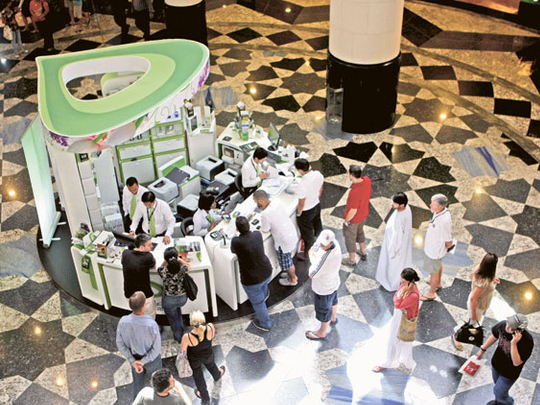
Dubai: Etisalat is set to roll out tablets and smartphones running on the 4G LTE network in the third quarter of this year, Saeed Y. Abdullah Al Zarouni, etisalat's senior vice-president of mobile networks, told Gulf News.
LTE stands for "long term evolution" — it is a radio access technology to deliver very high speeds — of up to 150Mbps. LTE does not support voice and SMS and the UAE offers dongles to access high-speed data.
Etisalat launched the world's first LTE-Frequency Division Duplexing (FDD) network that allows full mobility and smooth transition between LTE and HSPA+ last September.
Al Zarouni said: "We are testing tablets and phones from manufacturers like Samsung, LG and HTC. We are testing the Samsung tablet and most probably we will launch it in May."
He said since Apple's next-generation tablet is not compatible with the UAE's wavelength and as it is competing with Samsung to spur sales, the US firm is expected to follow the South Korean firm to bring iPads suited for the region.
Etisalat uses 2.6GHz spectrum for indoors and 1800MHz spectrum for outdoors. "We are also working with TRA to launch 800MHz bandwidth for nationwide LTE," he said.
Subscribers
Matthew Reed, principal analyst at Informa Telecom and Media, said there are 15 million subscribers globally, out of which eight million are with US operator Verizon Wireless.
According to Informa, the uptake of LTE is very slow — globally and regionally — due to lack of devices, and it will take several years for LTE to really become a mass-market technology.
"Although none of the operators will reveal their LTE subscription numbers, the indications were that the number of LTE subscriptions in the region is still only in the low thousands. Operators in the Middle East are also still in the early stages of developing their pricing and promotion of LTE to consumers," he said.
In the past year, Reed said that four Middle East operators have launched LTE — etisalat in the UAE; STC, Mobily and Zain in Saudi Arabia.
"Etisalat has deployed around 1,000 base stations and its current LTE footprint spans major cities covering 80 per cent of the population," Al Zarouni said.
He said, "Our LTE network is capable of delivering very high speeds — up to 150Mbps, but we don't have dongles to support it. The devices available in the market can only support up to 100Mbps."
Mobile broadband speed
Etisalat is set to double its 3G mobile broadband speed to 84Mbps from the current 42Mbps by the first quarter of next year due to the strong demand for broadband hungry applications, a top company official said.
"Etisalat's mission is to bring the future of communications to the most dynamic regions in the world, no matter how challenging or demanding the market," Saeed Y. Abdullah Al Zarouni, etisalat's senior vice-president of mobile networks, said.
Over the last year, etisalat has witnessed a 200 per cent growth in data roaming traffic.
Etisalat has a nationwide 3G network covering 99 per cent of the UAE's populated area.
He said, "Our network is ready for 84Mbps, but the current devices can only support up to 42Mbps."












